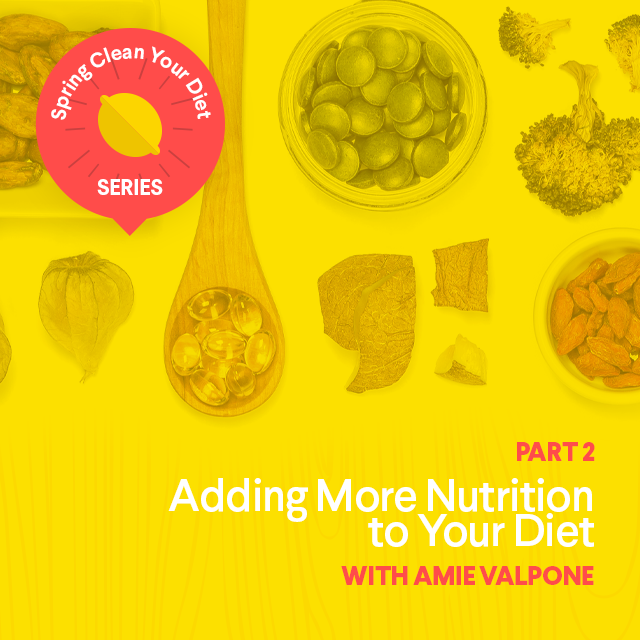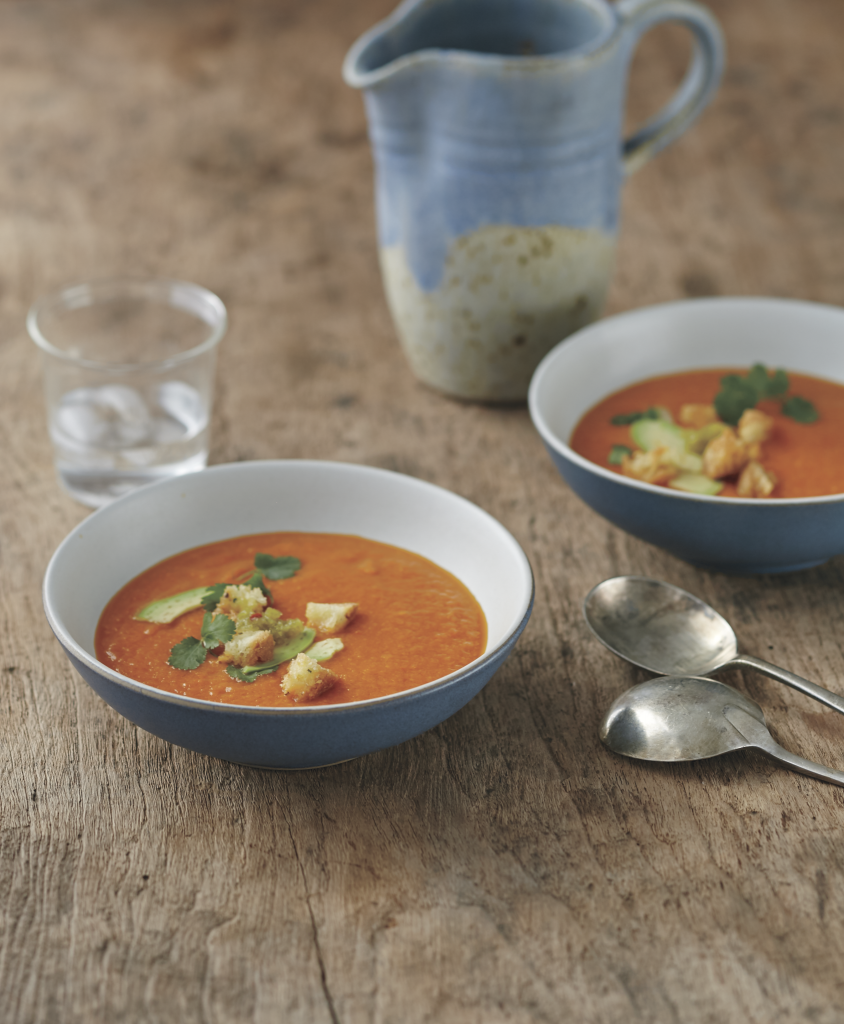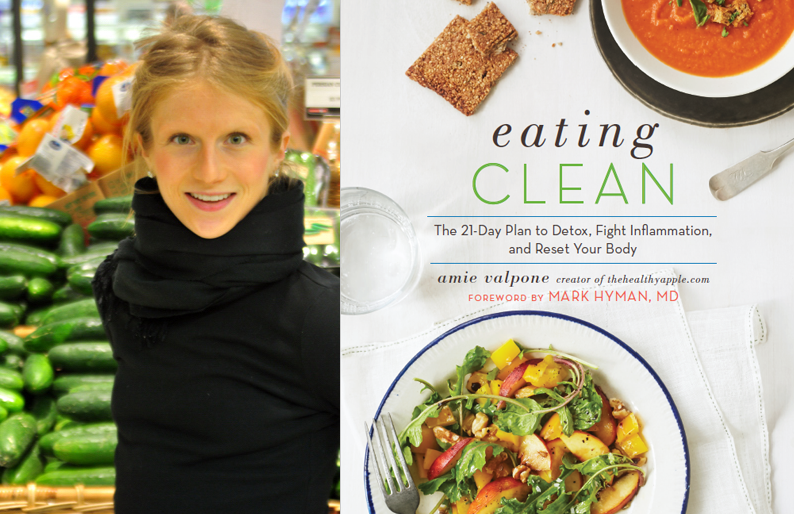We’re back with part two in our three part Spring Clean Your Diet with Amie Valpone series. Amie is a good friend of ours and author of the new book Eating Clean: The 21-Day Plan to Detox, Fight Inflammation and Reset Your Body. If you missed part one of the series, check it out here.

In last week’s post, we talked about the small steps you can take to reset your diet as a form of detoxification. These steps included adding more fruits and vegetables to your meals, cutting our sodas and junk food, adding a few hours of exercise to your week and drinking more water. All of these steps can help your body’s natural detoxification processes by helping your digestive system.
Looking back on the definition of the word “detox” – a process or period of time in which one abstains from or rids the body of toxic or unhealthy substances – it can seem like all you have to do is not eat or drink certain foods. While that’s certainly part of the equation, adding nutrient-dense foods to your diet is just as important (after all, you have to replace your candy habit with something, right?)
Spring Clean Your Diet with Amie Valpone Part 2: The Restart
The world of vitamins, minerals, and nutrients can be confusing to those of us who haven’t dedicated years of study to medicine and nutrition. But we can all understand that adding more nutrition, in the forms of vitamins, minerals and supplements, can help us close the gap where our food choices fall short.
Amie has a unique position: she’s not only a culinary nutritionist and cook book author, she’s also battled with and overcome: heavy metal accumulation, hypothyroidism, adrenal fatigue, PCOS (polycystic ovarian syndrome), and chronic fatigue, among other things. On her journey to wellness, she trusted and consumed plenty of the following foods and vitamins daily:
Probiotics
Probiotics are live microorganisms that may provide health benefits when consumed in adequate amounts (“adequate” depend on the individual). The benefits of these good bacteria may include supporting immunity and a healthy digestive system, and some research suggests probiotic supplements may be able to improve mood and fight depression.
Fermented or cultured foods are typically rich in probiotics and also provide other essential nutrients that probiotic supplements don’t. They’re also delicious! Consider trying some of the following foods:
- Kefir (also rich in protein, calcium and vitamin D)
- Miso
- Kimchi
- Sauerkraut
- Tempeh
Prebiotics
In technical terms, prebiotics are non- living, non-digestible carbohydrates found in different quantities in a variety of foods. In non-technical terms, they’re natural parts of foods that can’t be digested. By people, at least. They serve as “food” for probiotics and are found in common foods such as:
- Sunchokes/Jerusalem Artichokes
- Asparagus
- Bananas
- Onions
- Garlic
- Whole Grains
Some people refer to prebiotics as “the fertilizer of the digestive system” because the promote the growth of good bacteria. Prebiotics and probiotics work together in your digestive system to make sure everything stays on track.
Vitamin D
A deficiency in vitamin D is very prevalent among Americans, especially minorities. Vitamin D is important for bone strength, as well as mineral absorption (including calcium). Vitamin D deficiency is also various forms of cancer, heart disease, depression and weight gain. If you suspect you’re deficient in vitamin D, consult a trusted healthcare practitioner for more information. A high-quality supplement can help provided you with your needed vitamin D, but good old-fashioned sunlight is by far the easiest way to get your daily dose.
If you live in an area where the sun seems absent for long periods of time (or it’s too cold to be outside with exposed skin), you might want to consider including some of the following vitamin D rich foods:
- Fish Oil (fermented cod liver oil especially)
- Salmon
- Tuna
- Eggs
- Fortified dairy products, including milk, kefir and some cheeses
Vitamin B12
Vitamin B12 deficiency mimics symptoms people commonly attribute to aging, such as fatigue, lethargy, memory decline/loss, and decreased mobility. Increasing your natural consumption of B12 through through food or supplement can help you start to feel better.
Vegans and vegetarians are more susceptible to B12 deficiency because vitamin B12 is found in the highest concentrations in animal products, specifically clams, beef liver and beef in general. Some vegetarian-friendly options include:
- Fortified soy products
- Lowfat milk, kefir and cheese
- Chicken eggs
- Fortified nut milk beverages
Antioxidants
A blanket term for the variety of nutrients found in fruits and vegetables, antioxidants are substances that may prevent or delay some types of cell damage. Antioxidants are also big players in the world of cancer research right now, with some studies showing they may reduce the effects of free radicals – the potentially harmful chemicals that are linked to cancer and heart disease. Blueberries, strawberries, carrots, grapes, and dark leafy greens are all rich in antioxidants, so eat up.
To help you ramp up your antioxidant and vitamin intake, Amie shared with us the following recipe for Golden Bell Pepper Soup, fresh from her new book Eating Clean. Give it a try! You can also find our favorite (mostly healthy) recipes, all made with Lifeway Kefir, here. Bonus: our Drink Your Colors with Kefir series goes into detail about the different types of antioxidants, and how they be benefit your body. Check it out!
Golden Bell Pepper Soup

Dipping your spoon into this bell pepper–sweet potato combo is like dipping into a bowl of sunshine. It’s stunning—and the perfect antidote to a gloomy winter’s day. Even better, by adding a cup of Lifeway Organic Whole Milk Kefir before serving makes the soup extra creamy AND keeps the probiotics live and active (just be sure not to serve the soup too hot).
- 1 cup Lifeway Organic Whole Milk Plain Kefir
- ¼ cup extra-virgin olive oil
- ½ small onion, diced
- 2 medium carrots, peeled and diced
- 1 celery stalk, diced
- Sea salt and freshly ground black pepper, to taste
- 8 yellow, red and/or orange bell peppers, chopped
- 1 large sweet potato, peeled and chopped
- 3 cups low-sodium vegetable broth
- 3 teaspoon finely chopped fresh marjoram
- Your favorite gluten-free croutons, for garnish
- Sliced avocado, for garnish; optional
- Finely chopped fresh cilantro, for garnish; optional
In a large pot, heat the oil over medium heat. Add the onion, carrot, celery, and a pinch of salt and black pepper. Cook until the vegetables are tender, about 4 minutes.
Add the bell peppers and cook until soft, about 6 minutes. Add the sweet potatoes and broth. Season with salt and black pepper, cover the pot, and bring to a boil.
Lower the heat and add the marjoram. Simmer until the vegetables are tender, about 20 minutes.
Let the soup cool slightly, and then, in batches, transfer to a blender and puree until smooth – it will be thick. Adjust the seasoning with salt and black pepper if necessary. Return the soup to the pot to keep warm until serving.
Just before serving, stir in one to one and a half cups of room temperature Lifeway Organic Whole Milk Kefir (using room temperature kefir helps keep the soup warm). Ladle into bowls and garnish as desired.
Alternatively, you can ladle the soup into individual bowls and drizzle in ¼ cup of kefir before garnishing.
SERVES 6 to 8
Text excerpted from EATING CLEAN, © 2016 by AMIE VALPONE. Reproduced by permission of Houghton Mifflin Harcourt. All rights reserved.
Let us know what you think and be sure to check back next week for part three of the series!
+++
Meet Amie Valpone
Amie Valpone, HHC, AADP, author of the new book Eating Clean, is a Manhattan based Personal Chef, Culinary Nutritionist, Professional Recipe Developer, Food Photographer and Writer specializing in simple Gluten-free, ‘clean’ recipes for the home cook. A long-time Lifeway Kefir fan, she has continuing education certifications from the Institute of Integrative Nutrition and Columbia University as well as the Drugless Practitioners of America. Learn more about her by visiting TheHealthyApple.com

A brief disclaimer: we’re not doctors and we don’t know you personally. These tips, suggestions and ideas are what work for us, but you know yourself best. Be sure to speak with a medical professional or nutrition expert who knows your history before undertaking a new eating plan.